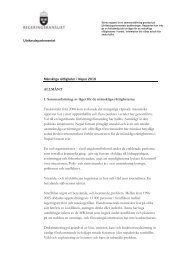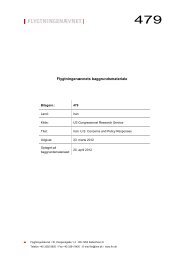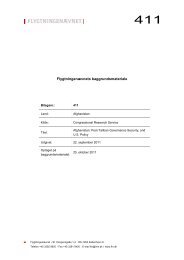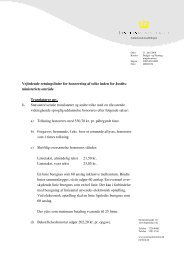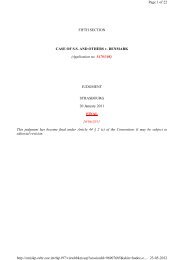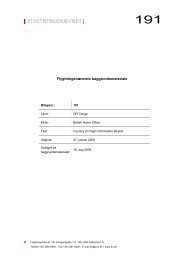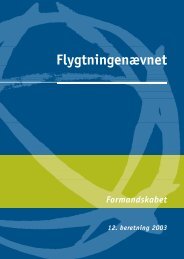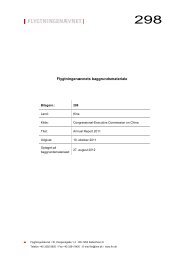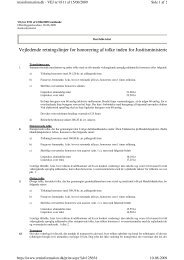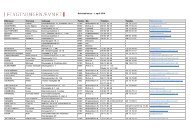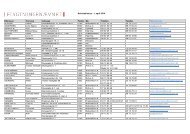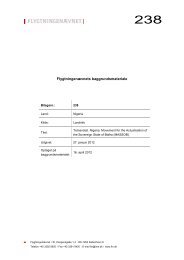Annual Report - National Human Rights Commission
Annual Report - National Human Rights Commission
Annual Report - National Human Rights Commission
Create successful ePaper yourself
Turn your PDF publications into a flip-book with our unique Google optimized e-Paper software.
Annexure 8<br />
○ ○ ○ ○ ○ ○ ○ ○ ○ ○ ○ ○ ○ ○ ○ ○ ○ ○ ○ ○ ○ ○ ○ ○ ○ ○ ○ ○ ○ ○ ○ ○ ○ ○ ○ ○ ○ ○ ○ ○ ○ ○ ○ ○ ○ ○ ○ ○ ○ ○ ○ ○ ○ ○ ○ ○ ○ ○ ○ ○ ○ ○<br />
○<br />
After listening to the testimonies the panel has decided to take cognisance of only a small part of<br />
them as individual human rights cases. Though the other individual cases are also heart-rending<br />
the panel thought it more useful to pursue the systemic causes behind these failures. For these<br />
systemic issues that underlie the denial of the right to health care the panel makes the following<br />
15 recommendations which are forwarded to the state governments for implementation.<br />
1. A Vigilance Mechanism must be built up in each state health department with assistance<br />
and in coordination with the police department. This vigilance should be proactive and<br />
not only responding to complaints. Its focus should be to prevent illegal charges in<br />
public health facilities, and private practice inside public health facilities or in public<br />
hours.<br />
2. All public health facilities should have display boards that state what are the legal user<br />
fees, if any, declare that payments other than these are illegal and inform where to<br />
register a complaint in this regard.<br />
3. Vigilance also needs to be exercised against unnecessary referrals to nursing homes,<br />
clinics, diagnostic services. To be effective on this the state governments have to issue<br />
orders disallowing public health staff from referring to nursing homes, clinics or<br />
diagnostic services where they have a monetary advantage or commission.<br />
4. Monitoring structures for health programmes should be established/strengthened at<br />
the district and block levels with the inclusion of panchayat representatives and civil<br />
society partners who are active in advocacy work.<br />
5. Monitoring structures for CHCs, civil hospitals and district hospitals should be<br />
established by either strengthening existing patient welfare societies or creating them.<br />
These would also have vigilance functions.<br />
6. Independent of the above two there should be a grievance redressal mechanism where<br />
those who have been denied quality care- in the private or public sector- can go to for<br />
registering their grievance and seeking relief.<br />
7. All areas which have had no doctor for over an year and all those areas which have had<br />
no nurse/midwife for over an year should be publicly notified as medically and<br />
paramedically underserved and a special package of measures must be undertaken to<br />
provide some temporary relief and access to care for these areas. ( eg visiting doctorpvt<br />
or public, mobile clinic, NGO, etc). This special package adopted may be made in<br />
consultation with all interested parties especially the elected panchayats.<br />
8. States should have a transparent non-discriminatory transfer policy such that doctors<br />
250<br />
<strong>National</strong> <strong>Human</strong> <strong>Rights</strong> <strong>Commission</strong> <strong>Annual</strong> <strong>Report</strong> - 2004-2005<br />
AR-Chapter-1-19-10-6-06.p65<br />
270<br />
7/17/06, 6:31 PM



